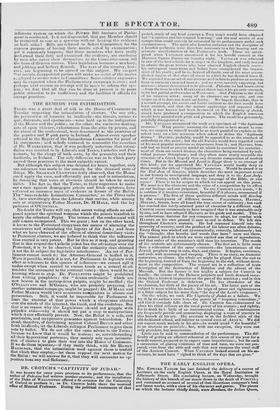THE REMEDY FOR INTIMIDATION.
THF:RE was a great deal of talk in the House of Commons on Tuesday respecting the intimidation of electors. On one side, the persecution of tenantry by landlords—the threats, notices to
quit, distraints, and ejectments—were held up to the indignation of the House and the public ; on the other, the exclusive dealing, acts of open violence, exhortations from the altar by priests, and the abuse of the confessional, were denounced as the practices of
the popular and P pish party in Ireland. Almost every speaker referred to the Report of the Intimidation Committee for proof of statements ; amid nobody ventured to contradict the assertion of Mr. WARBURTON, that it was perfectly notorious that intimi- dation was resorted to by Liberals and Tories, Catholics and Pro- testants' by the clergy of both sects, by the peasantry and their landlords, in Ireland. The only difkrence was as to which party carried these practices to the most culpable extent.
But although this subject was debated for hours together, only one ieference was made to the remedy for this diseased state of
things. Mr. SHARMAN CRAWFORD truly observed, that the House
could apply the cure, and effectually put an end to intimidation, by decreeing that votes at elections should be taken by secret ballot. The fact is, that the Tories, in their eagerness to make out a case against demagogue priests and Irish agitators, have col!ected an immense mass of evidence in favour of the Ballot.
The "imperishable Intimidation Committee," as the Times calls it, have unwittingly done the Liberals that service, while aiming only at stigmatizing Father MAHER, Dr. WHALE, and the lay partisans of O'CONNELL. No doubt the Tories will say, that secret voting affords no safe- guard against the spiritual weapons which the priests brandish to terrify the reluctant Papist. The terrors of the confessional will still remain unimpaired. This we grant ; but on the other hand, it leaves to the Protestant clergyman his means of alarming the consciences and stimulating the bigotry of his flock ; and from what we have observed of the effects of clerical domiciliary visits to Protestant electors, we are induced to think that the influence thus exerted is very potent. But be this as it may, and granting that in this respect the Catholic priest has the advantage over the Protestant, it is to be observed, that the authority thus obtained is not the fit subject for legislative interference. An act of Par- liament cannot reach it; the Attorney-General is baflled by it. Were it possible, which it is not, for Parliament to legislate with effect in reference to this species of influence—we cannot call it undue except when carried to excess (such as a refusal to ad- minister the sacrament to the recusant voter)—there would he no knowing where to stop. Dr. Pittr.Lnorrs might be prohibited from writing pamphlets; the " drums ecclesiastic" which are now beaten in the metropolitan pulpits, might be mulled ; the OSULLIVANS and WGHEES, who are probably preparing for another autumnal campa;gn, might be gagged; Dr. 1WHALE and Father Maitsa would Lave numerous companions in silence and persecution. Still, it would be impossible for Parliament to limit the exercise of that power which a clergyman obtains over the minds of the ignorant, the timid, and the credulous. But that is no reason why the Legislature should not grapple with palpab!e evils—why it should not put a stop to malepractices which it can effectually prevent. Now, the Ballot is a safe, and practicable, and inexpensive guarantee against intimidation. In- stead, therefore, of declaiming against Colonel BatiEN and other Irish landlords, let the Liberals eallupon Parliament to give them vote by ballot. We do not offer the same advice to the Tories ; because we know that it would be useless; as notwithstanding all their hypocritical pretences, they mainly rely upon intimida- tion of electors to gain their way into the House of Commons. If we do them injustice,—if they really think, with Sir HENRY HARDINGE, that the intimidation used against them is tenfold that which they employ,—let them support the next motion for the Ballot: we will answer for it, that they will encounter no op- position from any real Reformer.


























 Previous page
Previous page